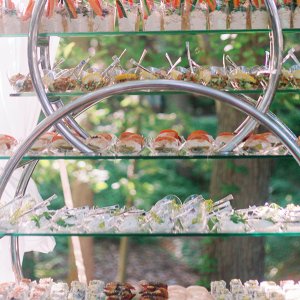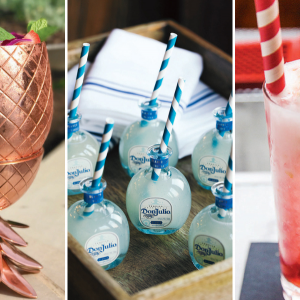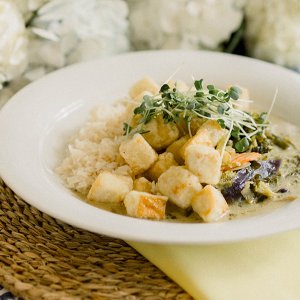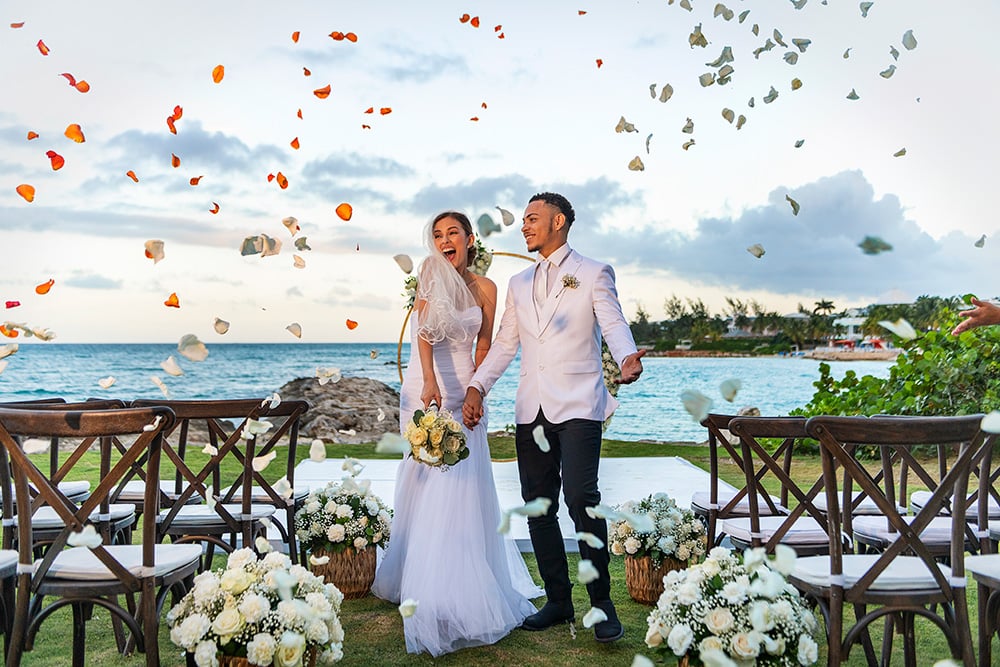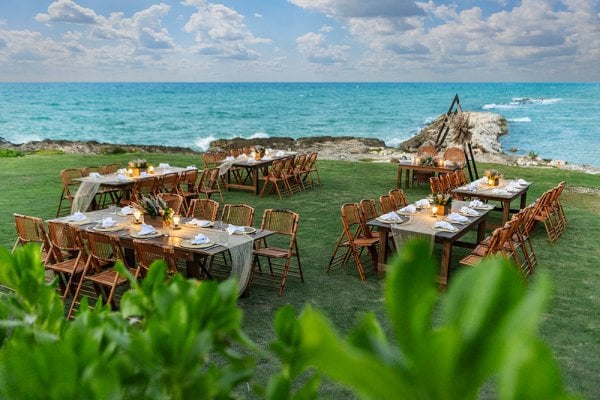Say I Do, one of Netflix's latest original shows about love, is beyond binge-worthy. The heartwarming series comes from the creators of Queer Eye and is centered around fulfilling couples' dreams for their long-awaited trips to the altar.
By: Bénja Gladden
Photo: Netflix
In the show, Chef Gabriele Bertaccini, event designer Jeremiah Brent, and fashion designer Thai Nguyen are given one week to pull off each couple's dream wedding — and somehow manage to do so in every single episode. Chef Gabriele opened up to us about what he hopes the show will give people, his own journey to food domination, and how he creates a menu that showcases a couple's personality.

Photo: Netflix
BG: What are the three things you'd like for viewers to take away from the show?
1. Love comes in many different ways, shapes and forms — our experiences in life, previous relationships, families we grow up with, and our culture shapes how we love. We all have an idea of what love is. If you'd asked me what love means to me before going into the show, I would've given you a completely different answer than what I'm giving you now. It really opened my eyes to the different ways to not only love someone but also to be loved. There's no right or wrong way; that love evolves, and our experiences with love evolve as we grow older. You can't define it or contain it, so we have to be malleable and open-minded to the experience of love.
2. It's important to create safe space for the ones we love to be themselves and to open up and, in turn, for us to be accepting. Life happens in the arena, and a lot of the time, we are outside of the arena without even realizing it, mostly out of fear. Create the arena for people to go in and live their lives. You see it in the show; we always tried to create moments for not only us but also the couples to open up about who they are, their struggles, and their fears. We should all try to create an arena in our own personal lives with our loved ones, family, and friends.
3. There is no "right time" for anything. We have to have trust in life and faith that things will always workout the best way possible, because they usually do. It's important to take the time to step back sometimes and simply let things unfold, instead of always having the need to control everything. Even when things go wrong— which you see in the show a lot — there are deeper stories of struggle and grief, and it's easy for us to make our struggles the center of the universe. It's important to not only feel your emotions but to rise above and keep your trust in life and the universe. You have to release the need to control everything and rest assured in the power of love.

Photo: Netflix
BG: Tell us what you'd like us to know about your journey thus far and how you got where you are today?
My journey today is constantly evolving and unfolding. As much as the lessons from the show apply to viewers, they also apply to me — they come from my heart because I'm learning them myself. Every day, I question what I'm doing, how i'm doing it, and what my purpose is. The show is really a great representation of my life now and what my journey has been so far. Over the last 35 years, I have constantly questioned what my purpose on this world is — it's not lost on me that my purpose ten years ago is not what it is today. The show has revealed to me that being vulnerable my eyes have been opened to the beauty of people in this world — I've received understanding from all over the world, and it's shown me my true purpose.
BG: How have you seen the wedding industry change since COVID-19 and your time on the show?
There have been so many changes! We personally have had to postpone 12 or 13 weddings this year; we basically skipped the entire wedding season. I think we are going back to more intimate weddings, which I think is a positive thing. I personally am not married, but when people ask me, I've always said I'd like a small wedding, with 50 guests and one long, beautiful table filled with delicious food. Obviously, we can't gather in big groups anymore, and I think it's changing the industry to do something that is more authentic to our hearts. Love is not a complicated or flashy thing, and it should be shared with the people that we feel most connected to.

Photo: Netflix
BG: How do you tackle blended culture weddings, and how big of a role does the menu play?
The menu is the clear representation of the story of the bride and groom and where they come from — as such, it's important that you represent them in a true and authentic way. The beauty of food is that it's the best role in the story and is really the true storyteller. When the bride and groom come from two different backgrounds, it's such a beautiful thing to be able to craft a menu that is truly common ground between these two different individuals. You really see it in the show as well— not just about culture, but also about their personal story. It takes sitting down to dig deep with the bride and groom to learn about what food represents in their lives. You take all the stories that they give you and tell it through the menu. I also feel like a wedding is a beautiful way to create new traditions, I always tell the couples not to be to attached to the past but to think of the menu as a springboard to create new traditions with their guests. I especially find it beautiful in cross-cultural weddings to look at the wedding menu as a new beginning.
BG: Do you have any planning or menu tips for making small celebrations more memorable?
Connect with ingredients at the source. If you have the luxury of having a farmers' market near you, look at the ingredients and talk to the farmers and people that grew that food for you. Talk to them about what you're buying, where it came from, and what kind of food it is, so that you can take that story and share it with your guests — remember that food is always a story.
Let guests cook with you. If you have guests over and they want to help, let them, because the beauty of food is that it's an activity and is best when shared. The dinner party doesn't start when everyone's eating; it starts the moment guests walk into the room. If they want to add an ingredient, bring wine, or roast from the home, just say yes. Let them be as much of a host as you are, because creating memories is what life's all about.
Imperfection is beautiful. Don't get hung up on the details like plates or one recipe. It's okay if a dish doesn't come out as you expected or if you burn something. It's not about the outcome but celebrating the process of cooking.

Photo: Netflix
BG: What are some of the wedding menu trends you're seeing right now?
To be completely honest, if it's a trend, I try not to pay attention to it. Trends are temporary, and that's not what I'm about — I'm into a classic elegance that never ages. One thing I have noticed, though, is a return to family flavors — flavors that connect us to our childhood. A little less fancy, more foods and flavors that feed the soul and bring us back to our roots.
BG: What are some of the frequently asked questions that you get from couples?
"Is it enough food?" My answer is almost always yes — we usually have enough food to fill a large pantry or feed an army. They are always afraid of lack of food, and I think it speaks a lot about the importance of weddings. We want to make sure to distribute and share this love with the people around us. There's nothing more intimate than feeding somebody; it's truly one of the highest acts of love.
I also get a lot of questions about guest allergies and making the menu friendly for them. I usually remind them that although the answer is always "yes," the wedding day is a time for their celebration, and they should do things that speak to them. I tell them to focus on creating a menu that speaks to their heart, and then we adapt to allergies.

Photo: Netflix

